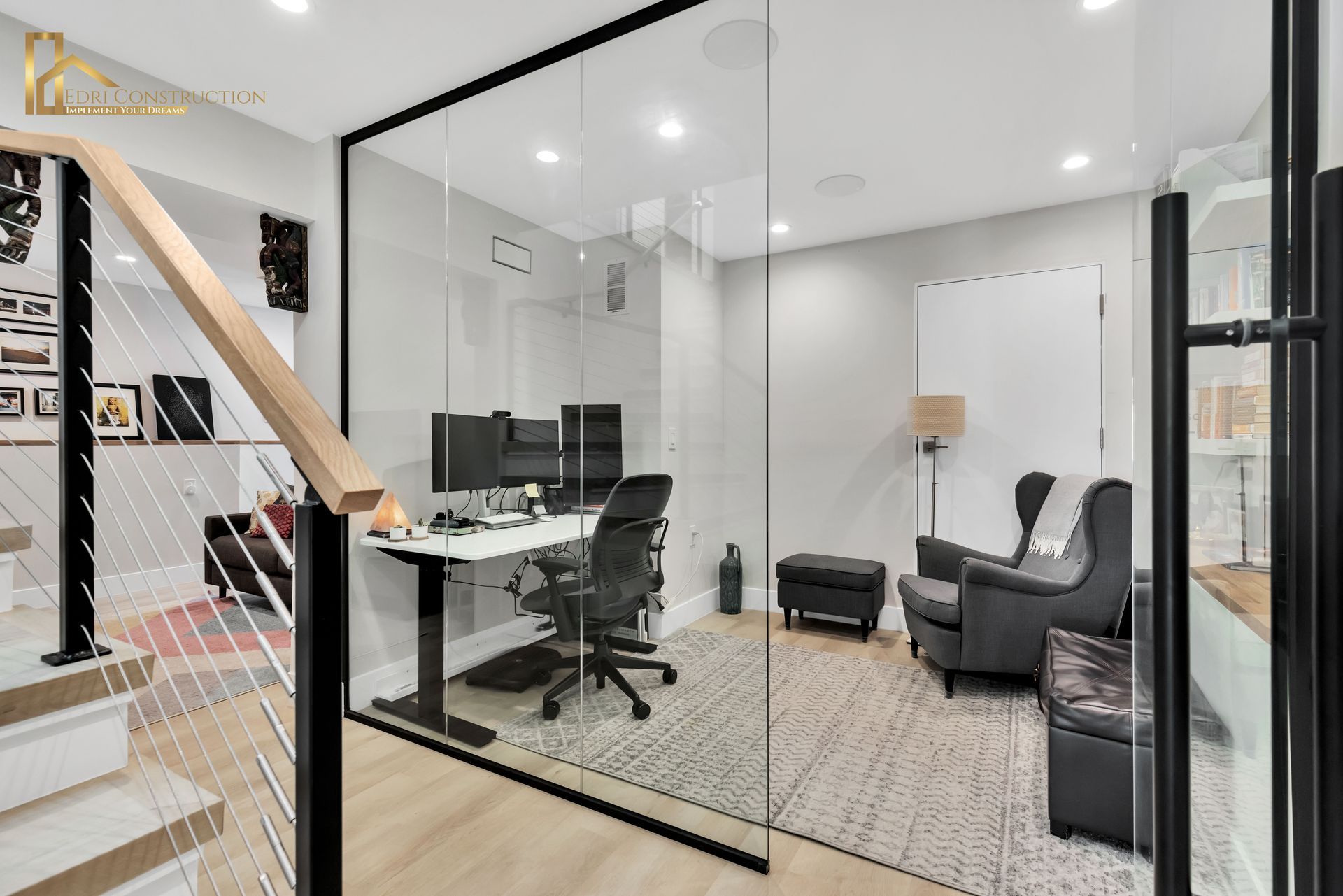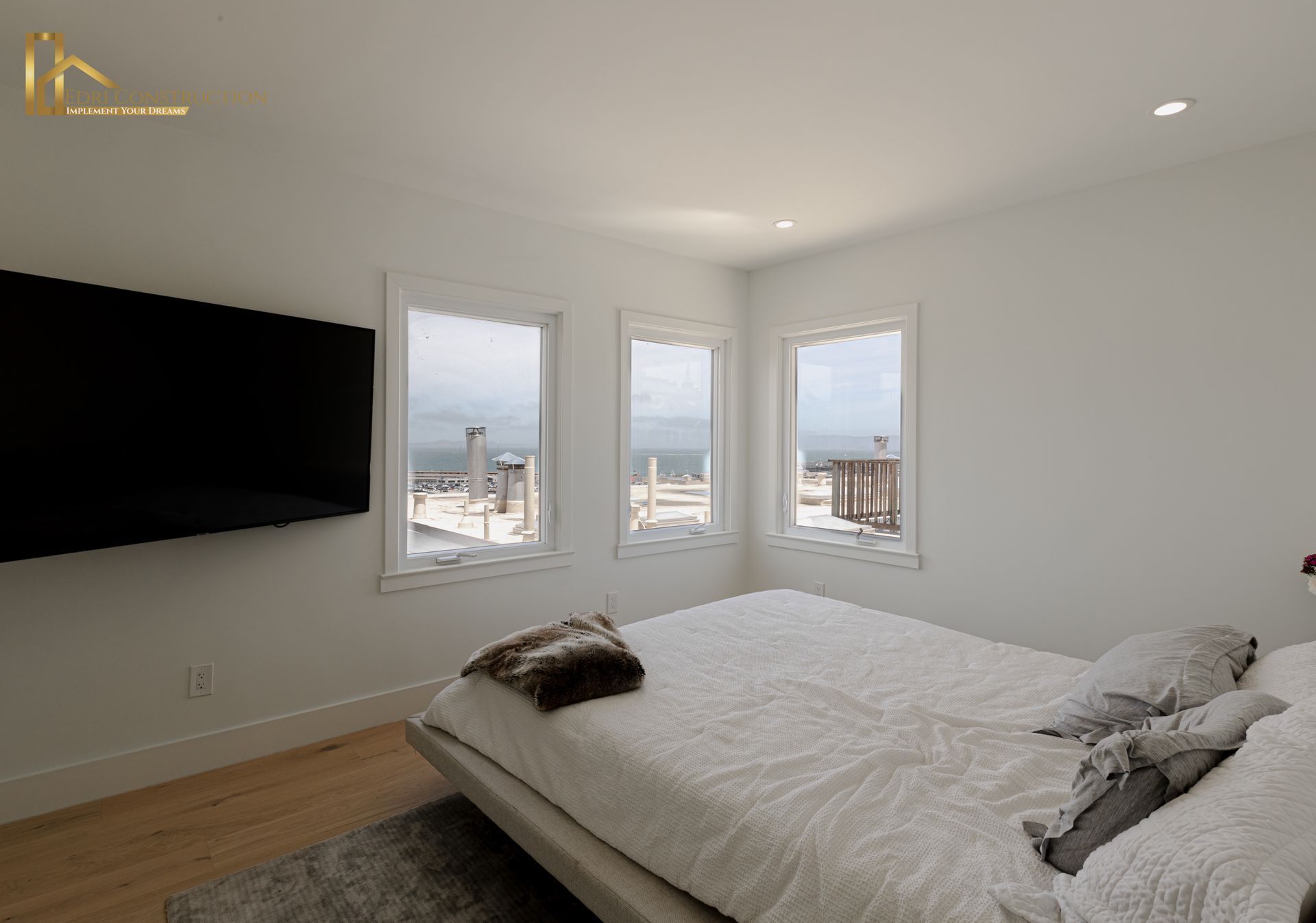What Common Mistakes Should I Avoid When Renovating My Home?

INTRODUCTION
Renovating your home can be an exciting endeavor. Whether you're aiming to modernize your living space, increase its value, or simply make it more functional, remodeling offers a myriad of advantages. However, diving into a renovation project without careful planning and consideration can lead to costly mistakes and headaches down the road. To ensure a successful home renovation, it's crucial to steer clear of these common pitfalls. In this comprehensive guide, we'll explore the best practices and essential tips for a smooth and successful home remodeling journey.
Advantages of Home Remodeling
Before delving into the dos and don'ts of home renovation, let's first highlight the numerous benefits it offers:
Enhanced Comfort and Functionality
Remodeling allows you to tailor your home to your specific needs and lifestyle preferences, improving overall comfort and functionality.
Increased Property Value
Well-executed renovations can significantly boost the resale value of your home, providing a solid return on investment.
Energy Efficiency
Upgrading to energy-efficient appliances, windows, and insulation during renovations can lead to long-term cost savings on utility bills.
Enhanced Aesthetic Appeal
A fresh, modernized look can breathe new life into your home, creating a space that reflects your personal style and taste.
Improved Safety and Security
Renovations provide an opportunity to address safety concerns and upgrade security features, ensuring a safer living environment for you and your family.
Lack of Proper Planning
A common misstep among homeowners is initiating a renovation venture devoid of meticulous planning. Hastening into construction sans a coherent vision, budget, and timeline can lead to unwelcome delays, unforeseen costs, and dissatisfaction with the final outcome. It's imperative to dedicate ample time to delineating your objectives, discerning your priorities, and crafting a comprehensive project blueprint prior to commencing any work.
Home renovation journey without a well-conceived plan is akin to setting sail without a navigational chart—it's bound to encounter turbulence along the way. Rushing headlong into construction without a clear roadmap can leave you adrift in a sea of uncertainties, susceptible to costly setbacks and discontentment with the end result.
To steer clear of this perilous pitfall, take the reins of your renovation project with foresight and precision. Invest the necessary time and effort into formulating a robust plan that serves as your guiding compass throughout the entire journey. Consider your overarching goals, delineate your must-haves and nice-to-haves, and map out a realistic budget and timeline that align with your aspirations.
Deliberate on every facet of your renovation endeavor, from structural modifications to aesthetic enhancements, and document your decisions with meticulous detail. By establishing a solid foundation grounded in clarity and foresight, you can navigate the complexities of the renovation process with confidence and poise.
A well-crafted plan not only serves as a roadmap for your renovation journey but also empowers you to make informed decisions and anticipate potential challenges. By proactively addressing logistical considerations, such as permits, subcontractor scheduling, and material procurement, you can preemptively mitigate risks and streamline the construction process.
The key to a successful home renovation lies in the power of foresight and strategic planning. By embracing a methodical approach and prioritizing thorough preparation, you can embark on your renovation journey with clarity, confidence, and the assurance of a rewarding outcome that exceeds your expectations. Remember, a well-thought-out plan is the cornerstone of a smooth and satisfying renovation experience, laying the groundwork for a home that truly reflects your vision and aspirations.
Ignoring Budget Constraints

It's tempting to be swept away by ambitious renovation dreams, but neglecting to set a practical budget can swiftly result in financial stress. Prior to embarking on any remodeling endeavor, it's crucial to conduct a thorough evaluation of your financial standing and ascertain the extent of your investment. Take into consideration unforeseen costs and distribute funds judiciously to prevent exceeding your financial means.
When contemplating a home renovation project, it's easy to succumb to the allure of grand designs and expansive visions. However, without a clear and realistic budget in place, even the most inspired plans can quickly unravel into a quagmire of financial strain and uncertainty. Before delving into the realm of remodeling, take a moment to assess your financial landscape with honesty and pragmatism.
Begin by scrutinizing your current financial standing, taking stock of your income, savings, and existing obligations. Determine the maximum amount you're willing and able to allocate towards your renovation project, keeping in mind your long-term financial goals and priorities. Resist the temptation to overspend or stretch beyond your means, as doing so can undermine the feasibility and sustainability of your project in the long run.
It's imperative to anticipate and plan for unexpected expenses that may arise during the course of your renovation journey. From unforeseen structural issues to fluctuating material costs, there are myriad factors that can impact the overall cost of your project. By incorporating a buffer for contingencies into your budget, you can mitigate the risk of financial strain and maintain greater control over your renovation finances.
Once you've established a realistic budget, it's essential to allocate funds judiciously across all aspects of your renovation project. Prioritize essential expenses, such as structural repairs and safety upgrades, before allocating resources towards aesthetic enhancements or luxury features. Strike a balance between quality and affordability when selecting materials and hiring contractors, ensuring that every dollar spent contributes to the overall success and longevity of your project.
While it's natural to be enthralled by ambitious renovation ideas, it's essential to ground your aspirations in the reality of your financial situation. By establishing a clear and realistic budget, anticipating potential expenses, and allocating funds judiciously, you can embark on your renovation journey with confidence and peace of mind, knowing that your project is built on a solid financial foundation.
Choosing the Wrong Contractor

Choosing the appropriate contractor is paramount to the triumph of your renovation endeavor. Resist the urge to hastily enlist the initial contractor you encounter and instead prioritize diligent research. Seek out seasoned experts renowned for their ability to deliver superior craftsmanship on time and within budget. Prioritize candidates with a verifiable history of excellence, and don't hesitate to request references, peruse online feedback, and solicit multiple bids to facilitate a well-informed decision-making process.
The selection of a contractor can make or break the success of your renovation project. Therefore, it's imperative to exercise prudence and discernment when navigating the multitude of options available. Rather than succumbing to impulsive decisions or succumbing to the allure of convenience, invest the necessary time and effort into conducting comprehensive research and vetting potential candidates.
Begin by seeking recommendations from trusted sources, such as friends, family members, or industry professionals, who have firsthand experience working with reputable contractors. Additionally, leverage online resources, such as review websites and social media platforms, to glean insights into the reputation and performance of prospective contractors.
Once you've compiled a list of potential candidates, delve deeper into their credentials and track record. Verify their licensing, certifications, and insurance coverage to ensure compliance with regulatory requirements and safeguard against liability. Moreover, scrutinize their portfolio of past projects to assess the quality and diversity of their workmanship.
When engaging with potential contractors, don't hesitate to pose probing questions and request references from previous clients. Reach out to these references to solicit candid feedback on their experiences and satisfaction with the contractor's performance. Additionally, request multiple bids from different contractors to compare pricing, scope of work, and proposed timelines.
The selection of a contractor should be guided by a comprehensive evaluation of their expertise, reliability, and compatibility with your project requirements. By prioritizing thorough research and informed decision-making, you can mitigate the risk of hiring an inexperienced or unreliable contractor and set the stage for a successful renovation journey. Remember, the right contractor is not only capable of bringing your renovation vision to life but also ensuring a seamless and stress-free experience from start to finish.
Neglecting Permits and Regulations
The significance of acquiring essential permits and adhering to building codes during a renovation is often underestimated by homeowners. Neglecting this crucial step can lead to penalties, project delays, and even the demolition of completed work. Prior to commencing any construction activities, take the time to acquaint yourself with local regulations and secure the necessary permits to prevent potential legal entanglements in the future.
It's not uncommon for homeowners to overlook the critical importance of obtaining permits and ensuring compliance with building codes when embarking on a renovation project. However, disregarding these regulatory requirements can have serious repercussions, ranging from financial penalties to protracted legal battles.
Before breaking ground on your renovation endeavor, it's essential to familiarize yourself with the specific permitting process and building regulations governing your locality. Research the applicable zoning laws, building codes, and permit requirements to ensure full compliance with legal mandates. Obtaining the requisite permits is not only a legal obligation but also a prudent measure to safeguard the integrity and safety of your renovation project. Permits serve as official authorization from the local authorities, confirming that your proposed construction activities meet the necessary standards and regulations.
Failure to secure the appropriate permits can result in severe consequences, including hefty fines, mandatory project halts, and even the issuance of stop-work orders. In some cases, non-compliant renovations may be subject to forced removal or demolition, leading to significant financial losses and project setbacks.
Moreover, compliance with building codes and regulatory requirements is essential for ensuring the structural integrity and safety of your renovated property. These codes are designed to uphold minimum standards for construction quality, fire safety, accessibility, and environmental sustainability. By proactively addressing permitting and regulatory considerations, you can mitigate the risk of legal complications and ensure a smooth and seamless renovation process. Engage with local authorities, building inspectors, and permitting agencies to navigate the permitting process efficiently and effectively.
Obtaining necessary permits and complying with building codes are essential prerequisites for any renovation project. By prioritizing regulatory compliance and adhering to legal requirements, homeowners can avoid potential pitfalls, safeguard their investments, and pave the way for a successful and trouble-free renovation experience. Remember, it's better to invest time and effort in securing permits upfront than to face the consequences of non-compliance later on.
Skimping on Quality Materials

Although the allure of saving money with lower-cost materials is strong, compromising on quality can prove detrimental in the grand scheme of things. Subpar materials are susceptible to premature wear and degradation, resulting in expensive maintenance and replacements over time. Prioritize investments in premium materials renowned for their durability, energy efficiency, and longevity, even if it entails stretching your budget marginally.
While it may be tempting to cut corners and reduce expenses by opting for cheaper materials, this approach can have detrimental consequences in the long run. Inferior materials are inherently less durable and resilient, making them susceptible to accelerated wear and degradation over time. As a result, homeowners may find themselves grappling with a litany of maintenance issues and costly repairs, ultimately negating any short-term cost savings.
To safeguard the longevity and integrity of your renovation project, it's imperative to prioritize the use of high-quality materials that are built to withstand the test of time. While premium materials may entail a higher upfront cost, their superior durability and performance can translate into significant long-term savings by reducing the frequency and expense of repairs and replacements.
Investing in energy-efficient materials can yield additional benefits beyond mere cost savings. Energy-efficient components, such as insulated windows, efficient appliances, and sustainable building materials, can help minimize utility expenses and reduce your environmental footprint. By prioritizing the use of eco-friendly materials, homeowners can contribute to a more sustainable and environmentally responsible living environment. When selecting materials for your renovation project, take the time to research and compare different options, weighing factors such as quality, durability, and lifecycle cost. Consult with industry professionals and suppliers to gain insights into the performance and suitability of various materials for your specific application.
While it may be tempting to cut costs by opting for cheaper materials, skimping on quality can prove to be a costly mistake in the long run. By investing in high-quality materials that prioritize durability, energy efficiency, and longevity, homeowners can ensure the longevity and resilience of their renovation projects while minimizing the risk of future maintenance headaches and expenses. Remember, when it comes to materials, it's better to prioritize quality over cost savings to safeguard your investment and maximize the value of your renovation endeavors.
Overlooking the Importance of Lighting
The importance of adequate lighting in shaping the atmosphere and usability of your home cannot be overstated, yet it's a facet of home renovations that frequently escapes attention. Dedicate ample consideration to devising a comprehensive lighting strategy, integrating a blend of natural illumination and artificial fixtures to optimize visibility, ambiance, and aesthetic appeal across your living space.
While it may seem like a minor detail, the impact of lighting on the overall look and feel of your home is profound. Thoughtfully planning your lighting scheme can elevate the atmosphere, functionality, and visual appeal of each room, transforming mundane spaces into inviting sanctuaries that cater to your lifestyle and preferences.
Begin by assessing the unique lighting needs and characteristics of each area in your home, taking into account factors such as room size, layout, and intended use. Identify focal points, task areas, and architectural features that warrant special attention, and tailor your lighting design to accentuate their prominence and functionality.
Incorporating a diverse array of light sources is key to achieving a balanced and versatile lighting scheme. Integrate natural light whenever possible, leveraging windows, skylights, and strategically placed openings to infuse your home with the warmth and vitality of sunlight. Complement natural illumination with a carefully curated selection of artificial fixtures, including overhead lighting, task lighting, and accent lighting, to address different lighting needs and create visual interest.
When selecting lighting fixtures and bulbs, prioritize energy efficiency, functionality, and aesthetic compatibility with your interior decor. Opt for LED or CFL bulbs that offer long-lasting performance and consume less energy, helping to reduce utility costs and minimize environmental impact. Experiment with different lighting styles, such as recessed lighting, pendant lights, and sconces, to achieve the desired ambiance and visual effect in each space.
Don't underestimate the transformative power of lighting controls and accessories in fine-tuning your lighting environment. Install dimmer switches, timers, and smart lighting systems to customize brightness levels, adjust color temperatures, and create dynamic lighting scenes that adapt to your daily routines and moods.
Proper lighting is a crucial yet often overlooked aspect of home renovations that can significantly enhance the comfort, functionality, and aesthetics of your living space. By investing time and effort into planning a thoughtfully curated lighting scheme, you can create a welcoming and harmonious environment that reflects your unique lifestyle and preferences. Remember, the right lighting can make all the difference in transforming your house into a place you're proud to call home.
Neglecting Energy Efficiency

In the current era of heightened environmental awareness, prioritizing energy efficiency has become paramount for numerous homeowners. Overlooking the integration of energy-saving elements and appliances during your renovation endeavors can lead to elevated utility expenses and heightened carbon emissions. It's prudent to explore options for incorporating energy-efficient upgrades such as windows, insulation, appliances, and lighting into your home to diminish its ecological impact while enjoying long-term savings on energy expenditures.
As environmental consciousness continues to shape consumer behavior, an increasing number of homeowners are recognizing the significance of energy efficiency in mitigating their ecological footprint. Failing to incorporate energy-efficient features and appliances into your renovation plans can result in not only higher utility bills but also a greater strain on the environment.
To align your renovation efforts with sustainability goals and financial prudence, consider investing in a range of energy-efficient upgrades for your home. Start by evaluating opportunities to enhance insulation and weather sealing to minimize heat loss and improve thermal comfort year-round. Upgrading to energy-efficient windows with low-emissivity coatings and insulated frames can further optimize indoor comfort while reducing heating and cooling demands.
Additionally, prioritize the selection of energy-efficient appliances and fixtures, such as ENERGY STAR-rated refrigerators, dishwashers, washing machines, and HVAC systems. These appliances are specifically designed to consume less energy while delivering comparable or superior performance, translating into significant long-term savings on utility bills.
Another area ripe for energy-efficient improvements is lighting. Transitioning to LED bulbs and fixtures can yield substantial reductions in energy consumption compared to traditional incandescent or fluorescent lighting. Furthermore, incorporating lighting controls and sensors can enhance efficiency by enabling precise control over illumination levels based on occupancy and natural light conditions.
By embracing a holistic approach to energy efficiency in your renovation project, you can reap a multitude of benefits beyond mere cost savings. Reducing energy consumption not only lowers utility expenses but also contributes to the preservation of natural resources and the mitigation of greenhouse gas emissions.
Integrating energy-efficient features and appliances into your renovation plans is essential for minimizing environmental impact and maximizing long-term savings. By investing in upgrades such as insulation, energy-efficient windows, appliances, and lighting, you can create a more sustainable and cost-effective living environment while doing your part to combat climate change. Remember, every step toward energy efficiency is a step toward a greener, more prosperous future for generations to come.
Failing to Consider Future Needs

When strategizing for a home renovation, it's crucial to adopt a forward-thinking approach and anticipate how your requirements might evolve over the years. Steer clear of fleeting or specialized design trends that could lose relevance or functionality in the future. Instead, concentrate on incorporating enduring design features and flexible spaces capable of accommodating shifting lifestyles and tastes as your household dynamics change and mature.
A thoughtful and strategic approach to home renovation entails more than just addressing immediate needs; it involves envisioning your future requirements and preparing your living space to adapt accordingly. While it's tempting to succumb to the allure of trendy design fads or niche aesthetics, such choices often have a limited shelf life and may quickly fall out of favor or become impractical as time passes.
To future-proof your renovation investment, prioritize timeless design elements and versatile spaces that can effortlessly evolve alongside your family's needs and preferences. Opt for classic architectural styles, neutral color palettes, and durable materials that transcend passing trends and retain their appeal for years to come.
Additionally, consider the functionality and flexibility of each renovated space, striving to create environments that can seamlessly accommodate diverse activities and lifestyle changes. Designing with adaptability in mind allows your home to grow and evolve in tandem with your family, ensuring that it remains a comfortable and functional sanctuary for years to come.
Moreover, embrace modular and multifunctional design concepts that enable easy reconfiguration and repurposing of spaces to suit evolving needs. Flexible floor plans, convertible furniture, and multipurpose rooms empower you to optimize every square foot of your home and accommodate changing priorities and activities as they arise.
By prioritizing longevity and adaptability in your renovation decisions, you can safeguard your investment and enjoy a living environment that remains relevant and accommodating throughout the various stages of life. Remember, the true measure of a successful renovation lies not only in its immediate impact but also in its ability to stand the test of time and meet the evolving needs of your family for years to come.
Conclusion
Renovating your home is a rewarding endeavor that can enhance comfort, functionality, and value for years to come. By avoiding these common mistakes and following best practices, you can ensure a smooth and successful remodeling experience. Remember to plan meticulously, stick to your budget, hire reputable professionals, and prioritize quality materials and energy efficiency. With careful planning and attention to detail, you can transform your house into the home of your dreams.
Frequently Asked Questions About
Home Renovation
How do I know if my home needs renovation?
Signs that your home may need renovation include outdated features, deteriorating materials, lack of functionality, or a desire for a modernized look. Consider consulting with a professional contractor or designer for an assessment.
What are the advantages of renovating my home?
Home renovation offers several benefits, including enhanced comfort and functionality, increased property value, improved energy efficiency, enhanced aesthetic appeal, and improved safety and security.
How do I create a budget for my renovation project?
To create a budget for your renovation project, start by determining your priorities, researching the costs of materials and labor, setting aside a contingency fund for unexpected expenses, and being realistic about what you can afford.
How do I choose the right contractor for my renovation project?
When choosing a contractor, look for experience, reputation, licensing and insurance, references, communication skills, and compatibility with your project goals and budget. Don't hesitate to interview multiple contractors and ask for detailed estimates before making a decision.
Do I need permits for my renovation project?
The need for permits varies depending on the scope of your renovation project and local building codes. In general, major structural changes, additions, or alterations to plumbing, electrical, or HVAC systems will likely require permits. Check with your local building department for specific requirements.
How long will my renovation project take to complete?
The duration of a renovation project depends on various factors, including the scope of work, size of the project, availability of materials and labor, and unforeseen complications. It's essential to discuss timelines and milestones with your contractor to establish realistic expectations.
How can I ensure my renovation project stays on budget?
To keep your renovation project on budget, carefully plan and prioritize your expenses, stick to your budget as much as possible, avoid making impulsive decisions, anticipate and account for unexpected costs, and communicate openly with your contractor throughout the process.
What should I consider when choosing materials for my renovation project?
When selecting materials for your renovation project, consider factors such as durability, quality, aesthetics, maintenance requirements, and compatibility with your design vision and budget. It's also essential to choose materials that align with your sustainability goals, such as energy-efficient options.
How can I make my home renovation project more environmentally friendly?
To make your home renovation project more environmentally friendly, consider incorporating energy-efficient appliances, lighting, and HVAC systems, using sustainable materials such as bamboo flooring or recycled glass countertops, minimizing waste through recycling and repurposing, and investing in renewable energy sources such as solar panels.
How do I ensure a successful outcome for my home renovation project?
To ensure a successful outcome for your home renovation project, plan meticulously, hire reputable professionals, communicate openly with your contractor, be flexible and adaptable, expect the unexpected, and prioritize quality, functionality, and sustainability in your design choices.










